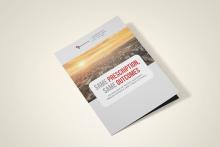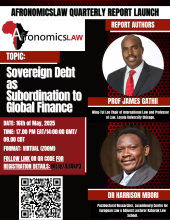Afronomicslaw Sovereign Debt Quarterly Brief No. 10, 2026: Development Finance in Africa and the Institutionalized Risk Premium
This study develops a new framework for understanding the premium by introducing the concept of an “institutionalized” African risk premium. In doing so, the study identifies three distinct forms of the African risk premium: (a) the perceived African risk premium; (b) the real African risk premium; and (c) the institutionalized African risk premium.

